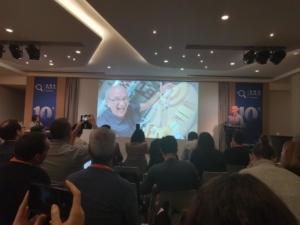As we do every year, part of The SEO team of Universem was present at the SMX Paris event. This edition was, as always, rich in conferences and information on the evolution of SEO! This time especially thanks to, in particular, a speech by John Mueller, webmaster and trends analyst at Google, who told us about what is new in 2020, foreseen by the Mountain View company!

The new BERT algorithm from Google
BERT and the automatic processing of natural language
If you follow the SEO news, you have probably heard of one of the biggest evolutions of the Google algorithm in recent years. The biggest change for the search engine at the moment: BERT, or Bidirectional Encoder Representations from Transformers, is an automatic natural language processing technique mixed with machine learning.
To sum up roughly, the advances of Google AI language researchers, applied to search engines, allow Google to better understand the search intent and its context. Google will therefore better understand longer and more complex queries.
BERT has been launched
During SMX, John Mueller was talking about a launch that would not take place for 6 months, however Google clarified on December 9th that the modification of the algorithm was now online for more than 70 languages! As with every algorithm change, organic traffic managers tremble for fear of seeing their traffic drop drastically and lose valuable visibility. Good news for them, BERT will not make a complete difference if you already produce quality content. On the other hand, this evolution has an influence on structured data and therefore, the sacrosanct position 0!
What can I do to prepare for the big bad BERT?
Work on your content strategies and make sure your landing pages are optimized on the right keywords. Your content must be 100% in line with the user intent behind the query on which you are trying to position yourself. In other words, there is no point in wanting to sell on an informational request and vice versa. As Google so aptly explains: “focus on the user and all else will follow.” Simple in practice, but far from being commonly applied!
EAT quality criteria are (always) crucial
Another nice American acronym, EAT, can be defined as “Expertise, Authoritativeness, Trustworthiness.” Appearing in Google’s Search quality Guidelines and officially present in the algorithm since August 2018, this notion is crucial for any effective SEO! Your site must show itself as an expert in its field and must prove that it is capable of transmitting the right information to its users. It must therefore position itself as a visible actor and be recognized and cited in the business’ sector or field. It must be reliable and provide clear reassurances.
These three points can be worked out in different ways, such as, for example, launching a high-level content strategy to naturally get interesting backlinks and thus increase its authority in a targeted area. This is, of course, just one example among many. Again, EAT doesn’t fundamentally change the way you do SEO, but focuses on the importance of providing maximum quality to your users!
Structured data are becoming more and more important
The web is made up of a lot of text. Yet search engines, even with recent advances, have only a limited understanding of this content and its context. Integrating structured data on a page, i.e. standardized data according to a predefined pattern, allow Google to better  understand and classify its content and to understand its relationship with other pages. Allowing the search engine to better understand a page will not de facto give you the best position for as many keywords as possible but will ensure that it is positioned where it needs to be.
understand and classify its content and to understand its relationship with other pages. Allowing the search engine to better understand a page will not de facto give you the best position for as many keywords as possible but will ensure that it is positioned where it needs to be.
In addition, the implementation of structured data also allows you to display additional features in search pages. For example, a review snippet under a product can increase the click rate of a search request for the most popular products, the results enriched FAQ page or the presence of “products” in Google images through a relevant markup!
In short, if you don’t use structured data yet, don’t wait any longer and try to integrate it into your various pages. They probably won’t significantly change your positioning, but they may enhance some of your positions with rich results which has a significant effect!
These three points, very briefly summarized, are obviously only a small part of a good optimization, but they are very important for all those who want to stay up to date on the evolution of the ever evolving SEO best practices!


